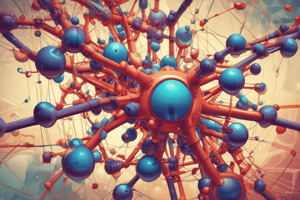Podcast
Questions and Answers
ما هو nomine ل PROCESS الذي يتم فيه ترتيب الجزيئات أو المكونات لتشكيل كيان mẹrukh?
ما هو nomine ل PROCESS الذي يتم فيه ترتيب الجزيئات أو المكونات لتشكيل كيان mẹrukh?
- التركيب الذاتي (correct)
- التوحيد الجزيئي
- الاعتراف الجزيئي
- الترابط الكيميائي
ما هو التعريف الأكثر دقة لجزيء الضيوف في الكيمياء الفوق الجزيئية؟
ما هو التعريف الأكثر دقة لجزيء الضيوف في الكيمياء الفوق الجزيئية؟
- جزيء يمكن أن يرتبط بجزيء آخر
- جزيء غير قادر على الارتباط مع другими الجزيئات
- جزيء يمتلك قوة كيميائية عالية
- جزيء يتم ربطه بواسطة جزيء مضيف (correct)
ما هو المفهوم الرئيسي في الكيمياء الفوق الجزيئية الذي يوضح القابلية على ربط جزيئات معينة مع بعضها البعض؟
ما هو المفهوم الرئيسي في الكيمياء الفوق الجزيئية الذي يوضح القابلية على ربط جزيئات معينة مع بعضها البعض؟
- ال認یزة الجزيئية
- الترابط/ion exchange
- التعارف الجزيئي (correct)
- الترابط الكيميائي
ما هو مجال البحث الذي يستفيد من هيئات فوق الجزيئية لتعزيز أو التحكم في التفاعلات الكيميائية؟
ما هو مجال البحث الذي يستفيد من هيئات فوق الجزيئية لتعزيز أو التحكم في التفاعلات الكيميائية؟
ما هو تطبيق الكيمياء الفوق الجزيئية في مجال النانوتكنولوجيا؟
ما هو تطبيق الكيمياء الفوق الجزيئية في مجال النانوتكنولوجيا؟
ما هو Beispiel للهيئات الفوق الجزيئية المستخدمة في كيمياء النانو؟
ما هو Beispiel للهيئات الفوق الجزيئية المستخدمة في كيمياء النانو؟
Quel est le rôle principal des molécules hôtes dans la chimie de l'hôte-invité?
Quel est le rôle principal des molécules hôtes dans la chimie de l'hôte-invité?
Quel est le type d'interactions impliquées dans la reconnaissance moléculaire?
Quel est le type d'interactions impliquées dans la reconnaissance moléculaire?
Quel est le mécanisme qui permet la formation de structures ordonnées à partir de molécules individuelles?
Quel est le mécanisme qui permet la formation de structures ordonnées à partir de molécules individuelles?
Quel est l'avantage principal de la catalyse supramoléculaire?
Quel est l'avantage principal de la catalyse supramoléculaire?
Quel est le domaine de la recherche qui bénéficie de la chimie supramoléculaire pour la conception et la manipulation de nanostructures?
Quel est le domaine de la recherche qui bénéficie de la chimie supramoléculaire pour la conception et la manipulation de nanostructures?
Quel est l'échelon de taille caractéristique des matériaux et des dispositifs étudiés dans la nanotechnologie?
Quel est l'échelon de taille caractéristique des matériaux et des dispositifs étudiés dans la nanotechnologie?
Flashcards are hidden until you start studying
Study Notes
Supramolecular Chemistry
Host-Guest Chemistry
- Study of non-covalent interactions between a host molecule and a guest molecule
- Host molecule: a molecular entity that binds to a guest molecule
- Guest molecule: a molecular entity that is bound by a host molecule
- Examples: crown ethers, cryptands, and calixarenes
Molecular Recognition
- Ability of a molecule to recognize and bind specifically to another molecule
- Based on spatial and electronic complementarity between molecules
- Key concept in supramolecular chemistry
- Applications: sensors, molecular machines, and biological systems
Self-Assembly
- Process by which molecules or components spontaneously organize into a structured entity
- Driven by non-covalent interactions (e.g. hydrogen bonding, π-π stacking, electrostatic)
- Examples: micelles, vesicles, and Langmuir-Blodgett films
- Applications: materials science, nanotechnology, and biology
Supramolecular Catalysis
- Use of supramolecular structures to enhance or control chemical reactions
- Catalysts: supramolecular complexes or assemblies that facilitate chemical reactions
- Examples: metal-organic frameworks (MOFs), supramolecular capsules, and self-assembled monolayers
- Applications: organic synthesis, environmental remediation, and energy applications
Nanotechnology
- Study and application of extremely small structures (1-100 nm)
- Supramolecular chemistry plays a key role in nanotechnology:
- Design of nanostructures and nanoparticles
- Self-assembly of nanostructures
- Properties and applications of nanostructures
- Examples: nanoparticles, nanotubes, and nanostructured surfaces
- Applications: electronics, medicine, energy, and materials science
Studying That Suits You
Use AI to generate personalized quizzes and flashcards to suit your learning preferences.




